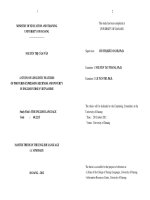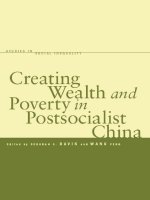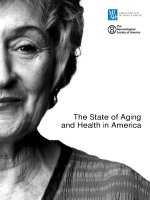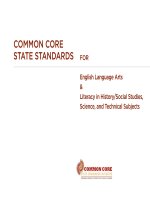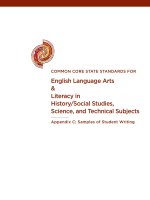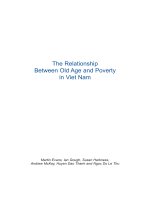Social Pension, Aging and Poverty in Malaysia
Bạn đang xem bản rút gọn của tài liệu. Xem và tải ngay bản đầy đủ của tài liệu tại đây (1.84 MB, 24 trang )
Social Pension, Aging and Poverty
Social Security Research Centre,
On life's Journey...
University of Malaya
Authors: Saidatulakmal Mohd (USM), Norma Mansor (UM) & Shamsulbahriah Ku Ahmad (UM)
Study funded by Social Security Research Centre, University of Malaya, Kuala Lumpur
What is this paper/research about?
Emerged from SSRC research on universal pension
lead by Dr. Saidatulakmal(USM)
Following from one of the conference theme
regarding population ageing and inadequate social
security schemes in Malaysia
Possible inputs for the Eleventh Malaysia Plan
Qualifications
Work in progress (raw draft) : while exploring what
could be the best option/s for cost
Preliminary approach: in this paper using sensitivity
analysis (proposed by the main author)
Other Approaches: calibration analysis, regression
analysis or as the World Bank PROST model and the
common cost benefit analysis.
Main Focus
This paper attempts to estimate the financial cost of social pension
schemes as a percentage to GDP.
Quantify the role of social pension in reducing elderly poverty in
Malaysia.
Estimations were made using the 2009 Household Income Expenditure
(HIES) survey.
To be replicated using the recent 2012 HIS data to further assess the
impact of social pension cost and poverty reduction.
The final analysis will be further corroborated by other supporting
data.
Structure
Background Information
Distribution of population in Malaysia
Year
Total
0-4
5-14
15-24
25-34
35-44
45-54
55-64
65-74
75+
1970
10,439.4
1,651.4
3,033.1
2,004.9
1,293.1
953.3
697.3
485.4
233.4
87.5
1980
13,136.1
1,779.6
3,416.3
2,758.6
1,933.2
1,295.3
888.1
589.6
334.7
140.7
1991
18,379.6
2,344.6
4,364.2
3,515.7
3,096.8
2,187.0
1,335.0
856.7
456.0
223.6
2000
23,274.7
2,612.7
5,138.3
4,454.2
3,721.2
3,192.5
2,087.4
1,167.6
610.8
289.8
2012
29,336.8
2,506.5
5,250.8
5,710.1
5,283.8
3,844.4
3,139.5
2,056.6
1,027.2
517.7
9.1
6.7
4.6
2.2
0.8
Number (‘000)
Distribution (%)
1970
100.0
15.8
29.1
19.2
12.4
1980
100.0
13.5
26.0
21.0
14.7
9.9
6.8
4.5
2.5
1.1
1990
100.0
12.8
23.7
19.1
16.8
11.9
7.3
4.7
2.5
1.2
2000
100.0
11.2
22.1
19.1
16.0
13.7
9.0
5.0
2.6
1.2
years an above increase from 7.6
2012
100.0
8.5
17.9
19.5
18.0
13.1
10.7
7.0
3.5
1.8
percent in 1970 to 12.3 percent in
• Percentage population aged 55
2012
• 2015 Malaysia’s population aged 65
years and above will be six percent
of the total population
Growth Rates of Elderly vs. Growth Rate of the Total Population
The growth of elderly population surpasses the growth
of the total population.
Table 2: Profile of elderly: HIES2009
Male : 48.05
Female : 51.95
Working : 24.55
Not Working/Others: 75.45
Bumiputra : 50.86
Chinese : 34.9
Indian : 5.28
Others : 8.96
Gender
AGE
60-64 : 36.33
65-69 : 25.72
70-74 : 18.82
75-79 : 9.8
80 & Above: 9.29
Working
Status
Characteristics of Marital
Ethnicity
elderly
Education
Primary : 43.25
Secondary : 19.42
Tertiary : 3.79
None : 33.54
Strata
Urban : 64.72
Rural : 35.28
Married : 65.08
Others : 34.92
Status
LIVED WITH
Others: 0.26
Alone: 6.18
Living
Arrangements Spouse: 17.94
Other Elderly: 1.31
Spouse & Adult Child: 64.17
Spouse & Young Child: 10.15
Table 2: Profile of elderly living in poverty: HIES2009 (revised)
60-64 : 5.75 (161)
65-69 : 7.97 (158)
70-74 : 10.06 (146)
75-79 : 13.89 (105)
80 & Above: 13.11 (94)
Working : 7.82 (148)
Not Working/Others: 17.76 (516)
AGE
Bumiputra : 11.10 (435)
Chinese : 2.79 (75)
Indian : 5.16 (21)
Others : 19.25 (133)
Employment
Status
Ethnicity
Primary : 7.62 (254)
Secondary : 2.0 (30)
Tertiary : 0.68 (2)
None : 14.62 (378)
Characteristic
of Elderly Living
in Poverty
Gender
Marital
Status
Education
Strata
Urban : 5.7 (285)
Rural : 13.94 (379)
Male : 7.00 (262)
Female : 10.00 (402)
Male (HoHH) : 7.9 (223)
Male (Mem) : 4.3 (39)
Female (HoHH) : 29.0 (230)
Female (Mem) : 5.3 (172)
Married : 12.7 (342)
Others : 6.4 (322)
Multi Pillar Framework to prepare for and live in
retirement
FOUR
FOURPILLARS
PILLARSOF
OFRETIREMENT
RETIREMENT
Study Focus: Pillar 0 - Methodology
Strengthening Pillar Zero
Exploring
Exploringthe
thepossibilities
possibilitiesof
ofintroducing
introducingsocial
socialpension
pension
Methodology – Objective One
Analysis
Analysisinclude:
include:
11
22
33
Methodology – Objective Two
Analysis
Analysisinclude:
include:
11
22
33
Table 4: Baseline simulation on projected cost of a
Social Pension
Table 4 Findings
If eligibility age was 60 years old, the costs decreased from 1.36 percent in
2010 to 1.02 percent in 2020, if benefits were kept fixed at RM400 per month.
• If benefit increased with percentage of GDP beginning 2013, cost increased from 1.02
percent in 2010 to 1.37 percent, if initial benefit was RM300 per month.
If eligibility age was 65 years old, the cost decreased from 1.72 percent in
2010 to 1.31 percent in 2020, with benefits fixed at RM800 per month.
• If benefit increased with percentage of GDP beginning 2013, cost increased from 0.86
percent in 2010 to 1.17 percent, if initial benefit was RM400 per month.
Table 5: Baseline simulation on poverty and projected
cost of a Social Pension – HIES2009
Conditions
Elderly Poverty Incidence (%)
Category
Eligib
ilty
Age
Income
Total
Recipie
nts
All Elderly
60
All Income
65
60
With
RM300
Social
Pension
With
RM400
Social
Pension
With
RM800
Social
Pension
With
RM300
Social
Pension
With
RM400
Social
Pension
With
RM800
Social
Pension
7,586
Witho
ut
Social
Pensi
on
8.46
2.61
1.27
0.00
2.74
3.65
7.31
All Income
4,826
8.46
3.98
2.91
1.84
1.74
2.32
4.65
642
8.46
2.61
1.27
0.00
0.23
0.31
0.62
502
8.46
3.98
2.91
1.84
0.18
0.24
0.48
60
RM800
&
below
RM800
&
below
All Income
5,624
8.90
2.97
1.51
0.00
2.03
2.71
5.42
65
All Income
3,840
8.90
4.20
2.97
1.67
1.39
1.85
3.70
60
501
8.90
2.97
1.51
0.00
0.18
0.24
0.48
412
8.90
4.20
2.97
1.67
0.15
0.20
0.40
60
RM800
&
below
RM800
&
below
All Income
3,549
8.00
3.72
2.38
0.91
1.28
1.71
3.42
65
All Income
2,131
8.00
4.94
3.84
2.58
0.77
1.03
2.06
60
RM800
below
RM800
below
&
450
8.00
3.72
2.38
0.91
0.16
0.22
0.43
&
371
8.00
4.94
3.84
2.58
0.13
0.18
0.36
65
Household with
co-residing
elderly member
65
Household
headed by
elderly
Pension Cost as a Percentage
of Income
65
Table 5: Findings
Highest cost incurred if the social pension schemes were given to all elderly
irrespective of income either at age 60 or at age 65 years old
• Change in poverty incidence ranged between -4.48 percent and -8.46 percent.
Social pension targeting only households with co-residing elderly
• Cost was highest if all households with co-residing elderly (aged 60 and above)
received the benefits with highest cost of 5.42 percent of income if benefits were
RM800 and 0.24 percent of income if benefits were RM400
• If the social pension was only targeted to poor households with co-residing elderly
aged 60 years and above, the cost as percentage of income was only 0.48 percent of
income if benefits were RM800 per month. Elderly poverty was also eliminated in this
case.
Table 5: Findings
Social pension Targeting households headed by elderly
• This targeted scheme covered the least number of elderly as they were only
3.549 households headed by elderly aged 60 years old and above, of which,
450 households were living below the PLI.
• If RM800 benefits were given to only the poor households, the cost as a
percentage of income was only 0.43 percent and poverty incidence reduced
to 0.91 percent.
Conclusion: Expanding coverage, fiscal sustainability and
addressing informality
Cost is normally cited as a major obstacle in providing social pension,
some form of social pension could be still implemented, while keeping the
cost at a minimum.
Sensitivity analysis indicated that the cost of social pension could be kept at
an average of 1.30 percentage of GDP; appropriate targeting reduces costs.
The 2009 HIES data also indicated that elderly poverty could eventually
be eradicated with social pension while cost of the social pension was kept
at reasonable levels
Social pension could be expanded to include other
excluded groups
Profile Data
Female Headed Households
Self-employed (own account workers) / Unemployed
Bumi / pribumis / “others”
Low Education / Uneducated
Is there a case for universal pension?
Should Malaysia adopt a “universal pension” initially for the
eradication of poverty among the elderly as a mandated policy
instrument:
• Moving from the residual to the “human right” approach “to
live with dignity in old age”. So social pension is not just
about the cost to the government but also can be seen as a
social responsibility.
• A multi-tier social pension system to cover excluded groups.
Thank you
Social Security Research Centre,
University of Malaya
Authors: Saidatulakmal Mohd (USM), Norma Mansor (UM) & Shamsulbahriah Ku Ahmad (UM)
Study funded by Social Security Research Centre, University of Malaya, Kuala Lumpur
